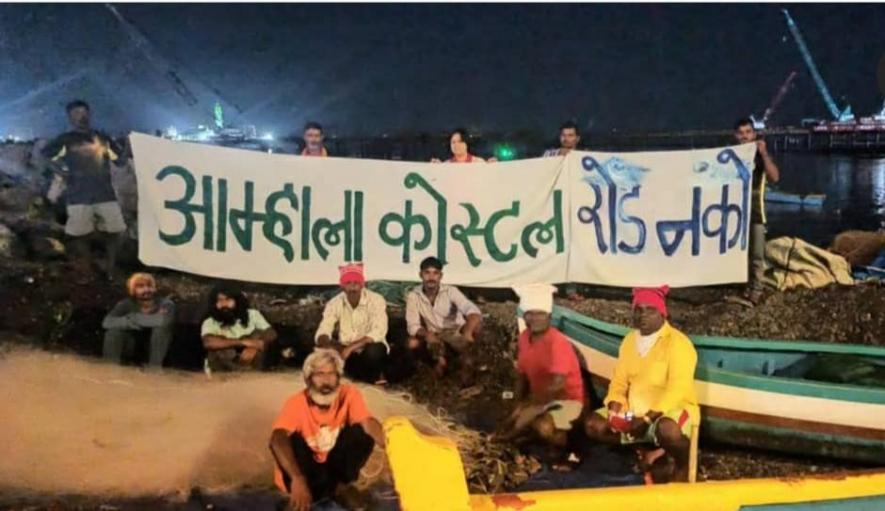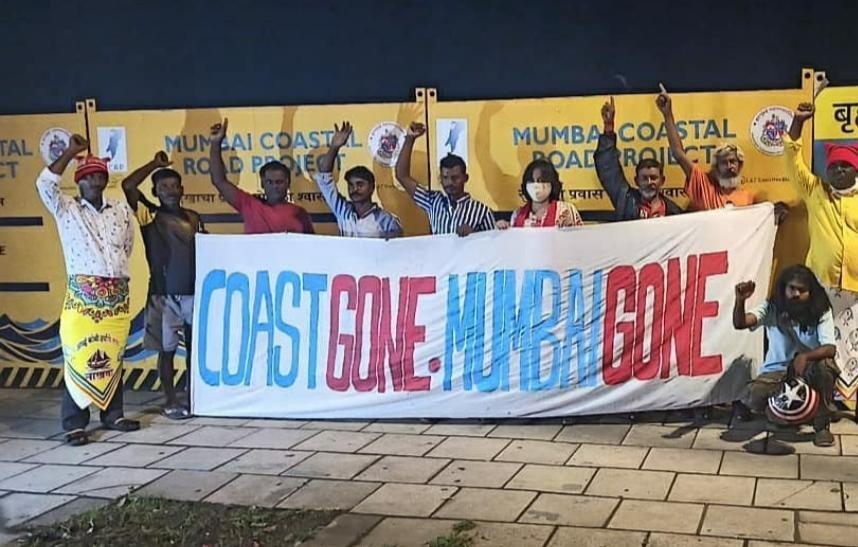Mumbai Coastal Road Will Destroy Livelihoods and the Environment, Say Fisherfolk

For nearly five years now, the construction of Mumbai’s ambitious eight lane, over 20 kilometer long road over the Arabian Sea has faced stiff opposition. Fisherfolk, activists and residents have been opposing the dilutions to law and policy which will lead to the destruction of the ecosystem of the mega-city to cater to a little over 1% of car drivers by making commute smoother.
While the Brihanmumbai Municipal Corporation (BMC) states that the work is on in full speed and the project could near its completion next year, fisherfolks grapple with the devastation the project has brought. The multi-crore project is reclaiming large portions of the sea, going up to 90 acre, forcing the communities dependent on the land to stare at debt and loss of livelihood. On August 22, on the occasion of Karali Purnima, celebrated by Kolis (fisherfolk) to mark the end of monsoon and beginning of the fishing season, the fisherfolk gathered at the Haji Ali site to protest against the construction and demand compensation. The fisherfolk state that due to the heavy construction work and the reclamation of the land, the fish have moved in deeper waters, areas in which the crabs were found also remain wrecked.
“Our livelihoods are taken away, there is no place for us to even keep our boats. We are in debt, crisis and deep distress. We have lost all of our nets, our vessels and even our boats. We were to be compensated, but we have not received anything. The government has used the COVID crsis to carry out these operations. We are even scared to speak up, we could be intimidated or harassed. They have destroyed all of our livelihoods, especially women. earlier we could handpick the fish and conduct artisanal fishing, however, with the construction process being sped up we do not even have money to eat.” said Sanjay Baikar, the secretary of the Vanchit Machimaar association. He added, “We are facing the brunt of the coastal road construction and the COVID crisis, we have been kept in the dark.”

The construction of the Rs 12,000 crore coastal road project is standing tall on a series of dilutions to environmental protection norms. The coastal road was first proposed in 2012 and was taken up as an election promise by the Bharatiya Janata Party (BJP), which came to power in Maharashtra in 2014 with support from the Shiv Sena. Until 2011, the Coastal Regulation Zone (CRZ) rules allowed construction of bridges to ensure natural flow of water bodies. However, this notification was amended later to incorporate construction in “special cases”. Moreover, in 2015, the amendments for the first time allowed construction of roads by way of reclamation (creating new land from oceans, rivers or lakes by filling the area with rock, sand, etc.) anywhere along India’s 7,500 km-long coastline without any environmental clearance, albeit in “exceptional cases” the definition of which was left undefined.
This meant the nullification of the original notification which had guaranteed environmental protection and livelihood security to the coastal community. The Modi government had approved an overhaul of the Coastal Zone Regulation (CRZ) rules in 2019. These changes are adversely affecting the livelihoods of the fishing communities. The fishing villages of Mumbai, called koliwadas—despite being located in an urban space—were granted CRZ III status by the 2011 law. It saved fishing communities from being “rehabilitated” in multi-storey buildings without basic amenities and infrastructure. However, that protection was removed in 2019.
Speaking to NewsClick, Shefali Alvares, Activist and a part of the group “Save Our Coast”, said, “Yesterday, we were told that the area which has been reclaimed for the trucks to go is a permanent structure to transport the material for construction—this has been built over an eco sensitive area. It is a destructive project in terms of clearances too. The CRZ clearances were applied differently—one in the north zone and one in the south to circumvent the requirement for an environmental clearance. First, the BMC denied the existence of corals and then further transferred them—this project has led to large-scale devastation and is based on systemic dilutions of policy.”
A previous investigation by IndiaSpend had revealed that the go-ahead given by the office of the Prime Minister ignored over 90% of representations objecting to the Coastal Regulation Zone Notification, 2019. Not just public inputs, once the process of accepting suggestions was over, the final draft of the CRZ approved by the Modi government had changes which were not put out in the public domain. These changes are seen to be aimed at benefiting corporations, allowing “public utilities” like sewage treatment plants, link roads, coastal roads, and ecotourism projects in sensitive and protected zones.
NewsClick had previously reported on how the notification was pushed to benefit the corporates, effects of which are being currently witnessed on the ground. Peter, General Secretary of the National Fishworkers’ Forum said that the “sole purpose” of the notification is “to pave the way to sell off the coastal lands and water to corporate business houses”.
The construction has also led to the shifting of coral reefs (Schedule I protected species), an exercise that has been questioned by marine biologists with many believing that the reefs would no longer survive post relocation.
Get the latest reports & analysis with people's perspective on Protests, movements & deep analytical videos, discussions of the current affairs in your Telegram app. Subscribe to NewsClick's Telegram channel & get Real-Time updates on stories, as they get published on our website.























